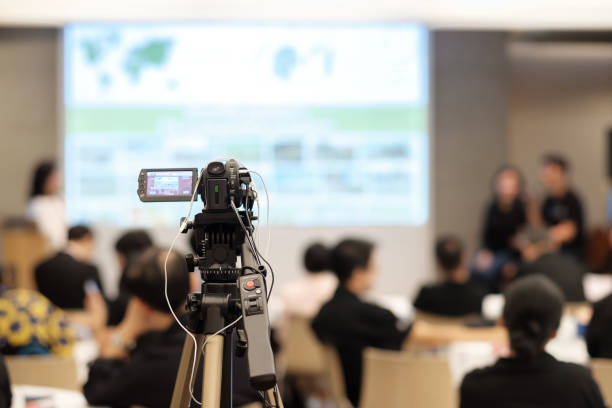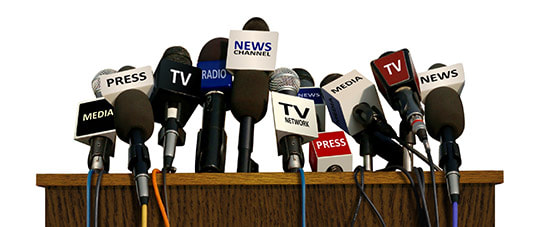Insight: Here's Why Media Training Is So Valuable...
In these not-so-business-as-usual days, businesses and business owners are pivoting. Conducting more meetings, and even coffee breaks and staff happy hours, by Zoom. Creating new, low-contact, or virtual services. Adjusting office spaces or adapting to work-from-home life.
I'm also seeing entrepreneurs take on learning new things. How to nail virtual presentations. How to use online tools to manage virtual teams. How to customize their Zoom experience. (I'm pretty proud of myself for figuring out how to do a custom Zoom background.) How to elevate their LinkedIn profiles. How to communicate their messages to the media.
It's that last one I want to tackle here: media training. It's a big undertaking, and something more clients and prospects have asked me about recently. Whatever the reason, timing, or motivation, it's always a good idea to learn how to deliver your message to reporters. But, remember, you're not talking to just reporters. When you appear in news and feature stories, you're actually communicating with customers, prospective customers, employees, potential partners, investors, and other stakeholders.
If you are thinking of investing time and money in media training, here are four things you should expect to learn or get from the experience.
1. You should prepare for brutal honesty. Don't waste your time or money on media training that promises to be anything less than brutally honest. This is often why companies hire outside media trainers; their internal teams are too soft, too easy.
Your media trainer should point out all of the areas you need to improve on -- for taking too long to answer questions to spouting off long-winded, convoluted answers that don't get to the point. Maybe you say "um" and "like" a lot or use a bunch of jargon. Maybe you missed an opportunity to communicate a key company message. Maybe you didn't have proof points to back up your answers. Maybe you don't seem likable or approachable. Your media trainer should cover it all and give you the tools you need to improve and succeed in your media interviews.
2. You should learn how to craft a message.Your media trainer should coach you on how to craft an effective message. The anatomy of an effective message is:
• It's succinct.
• It shows a clear benefit to the audience -- customers, for example.
• It's supported by proof points.
• It's memorable.
Remember, it's often less about who you are or your company per se and more about what you and your company do to solve problems, provide solutions, or fill a void and thus make people's work, business, or lives better.
3. You should get some tools and tricks.One of my favorite media training tools is called bridging. Basically, it means not accepting the question asked necessarily, but rather deftly shifting the conversation to your area of expertise or key message. This is especially effective in broadcast interviews, when what's most important is keeping the conversation moving. I always supply a cheat sheet of different interview tactics, including bridging, at the end of media training.
4. You should practice delivering your message.Your media training should include a fair amount of practice. I like to conduct mock media interviews with my clients. To prepare for phone interviews with print reporters, I leave the room and call my client, pretending to be a reporter working on a certain story. I then return to give feedback on how they did.
To prepare for broadcast interviews, we record interviews -- in a studio, when available. After each mock broadcast interview, we watch the playback, and I offer critiques. One thing we focus on here is time -- how long the answers take -- because on TV there's not a lot of time to get the right words out.
The practice, of course, extends beyond the media training. Your PR pros should always counsel you before and after media interviews. But you can be practicing on your own, too. I always advise clients to practice answers to questions, both aloud and in their heads, whenever they can -- on their runs, over their morning coffee, on the drive to work. Practice makes anything almost perfect, and that includes giving interviews to reporters and delivering your message and client benefit.
Online [Article] Source: Inc.com https://www.inc.com/rebecca-deczynski/ui-global-brands-urban-hydration-psyche-vontoba-terry.html
I'm also seeing entrepreneurs take on learning new things. How to nail virtual presentations. How to use online tools to manage virtual teams. How to customize their Zoom experience. (I'm pretty proud of myself for figuring out how to do a custom Zoom background.) How to elevate their LinkedIn profiles. How to communicate their messages to the media.
It's that last one I want to tackle here: media training. It's a big undertaking, and something more clients and prospects have asked me about recently. Whatever the reason, timing, or motivation, it's always a good idea to learn how to deliver your message to reporters. But, remember, you're not talking to just reporters. When you appear in news and feature stories, you're actually communicating with customers, prospective customers, employees, potential partners, investors, and other stakeholders.
If you are thinking of investing time and money in media training, here are four things you should expect to learn or get from the experience.
1. You should prepare for brutal honesty. Don't waste your time or money on media training that promises to be anything less than brutally honest. This is often why companies hire outside media trainers; their internal teams are too soft, too easy.
Your media trainer should point out all of the areas you need to improve on -- for taking too long to answer questions to spouting off long-winded, convoluted answers that don't get to the point. Maybe you say "um" and "like" a lot or use a bunch of jargon. Maybe you missed an opportunity to communicate a key company message. Maybe you didn't have proof points to back up your answers. Maybe you don't seem likable or approachable. Your media trainer should cover it all and give you the tools you need to improve and succeed in your media interviews.
2. You should learn how to craft a message.Your media trainer should coach you on how to craft an effective message. The anatomy of an effective message is:
• It's succinct.
• It shows a clear benefit to the audience -- customers, for example.
• It's supported by proof points.
• It's memorable.
Remember, it's often less about who you are or your company per se and more about what you and your company do to solve problems, provide solutions, or fill a void and thus make people's work, business, or lives better.
3. You should get some tools and tricks.One of my favorite media training tools is called bridging. Basically, it means not accepting the question asked necessarily, but rather deftly shifting the conversation to your area of expertise or key message. This is especially effective in broadcast interviews, when what's most important is keeping the conversation moving. I always supply a cheat sheet of different interview tactics, including bridging, at the end of media training.
4. You should practice delivering your message.Your media training should include a fair amount of practice. I like to conduct mock media interviews with my clients. To prepare for phone interviews with print reporters, I leave the room and call my client, pretending to be a reporter working on a certain story. I then return to give feedback on how they did.
To prepare for broadcast interviews, we record interviews -- in a studio, when available. After each mock broadcast interview, we watch the playback, and I offer critiques. One thing we focus on here is time -- how long the answers take -- because on TV there's not a lot of time to get the right words out.
The practice, of course, extends beyond the media training. Your PR pros should always counsel you before and after media interviews. But you can be practicing on your own, too. I always advise clients to practice answers to questions, both aloud and in their heads, whenever they can -- on their runs, over their morning coffee, on the drive to work. Practice makes anything almost perfect, and that includes giving interviews to reporters and delivering your message and client benefit.
Online [Article] Source: Inc.com https://www.inc.com/rebecca-deczynski/ui-global-brands-urban-hydration-psyche-vontoba-terry.html
POSH Media Training Offers The Following...
It takes skill to come across confident and competent in press interviews. Our Media Training Crash Course is designed to teach you how to deliver the right message with compelling sound bites the media will run with. Our Media Training Course removes the unknown so that you learn to think the way the media thinks.
A well-executed interview can be a key marketing piece on your website, news sites, and YouTube. All of which creates good publicity, SEO, web traffic and the right kind of attention.
Trying to wing it in an interview can result in a lost opportunity. Being prepared allows you to turn the tables on the press, so that you take control over your message rather than the media controlling your image. While some of these interviews may go “just fine,” a powerful opportunity may go awry-- Unless you call the audience to act on what your communication, nothing happens.
During this POSH Media Training Course you will:
Note: Being unprepared will result in a number of discrediting manners and poorly executed strategies, which are accentuated on camera, radio, or print. I've listed some major communications faux paus below--because you NEVER want to:
Our workshops make sure you learn the techniques and drills that will prepare you to face the media confidence and competence!
We will not just teach you these systems. We walk you through the process. The best way to learn the new skill of interviewing is by doing over and over exactly what you will be doing in front of a reporter. you are done with this training, you will have more than just a new understanding of what to do in media situation. You will have skills to generate the right kind of publicity. This kind of publicity will carry your message further than advertising.
BENEFITS:
WORKSHOP FORMAT
This self-paced workshop is available as a:
During the workshop we will address a wide-range of critical skills for delivering media interviews, such as:
So, what are you waiting on? Let's get started today! Regular Class price: $95 >> Today's Discounted Price: Only $45! ($50 SAVINGS)
A well-executed interview can be a key marketing piece on your website, news sites, and YouTube. All of which creates good publicity, SEO, web traffic and the right kind of attention.
Trying to wing it in an interview can result in a lost opportunity. Being prepared allows you to turn the tables on the press, so that you take control over your message rather than the media controlling your image. While some of these interviews may go “just fine,” a powerful opportunity may go awry-- Unless you call the audience to act on what your communication, nothing happens.
During this POSH Media Training Course you will:
- Learn how to organize your media messages
- How to be ready for any question
- How to speak in a way that is quotable
Note: Being unprepared will result in a number of discrediting manners and poorly executed strategies, which are accentuated on camera, radio, or print. I've listed some major communications faux paus below--because you NEVER want to:
- Look uncomfortable
- Sound scattered, ramble, use too many ums and ahs
- Appear disorganized
- Get stumped by tough questions
- Not quotable
- Not the expert on your topic
- Show irritation at interviewee mistakes
- Failure to create interest, sales, or web traffic
- No system to measure success for improvement
Our workshops make sure you learn the techniques and drills that will prepare you to face the media confidence and competence!
We will not just teach you these systems. We walk you through the process. The best way to learn the new skill of interviewing is by doing over and over exactly what you will be doing in front of a reporter. you are done with this training, you will have more than just a new understanding of what to do in media situation. You will have skills to generate the right kind of publicity. This kind of publicity will carry your message further than advertising.
BENEFITS:
- Have control during interviews
- Build confidence
- Look confident
- Sound confident
- Feel comfortable on camera
- Never be misquoted
- Reduce prep time
- Be prepared for hard questions or questions irrelevant to your message
- Create answers that are irresistible to media
- Look like a leader or an expert
- Create action from interviews
- Create sales from interviews
- Measure interview success
- Be crisis ready
- The art of weaving your messages into each answer
- Master body language & voice inflection
- Reduce nervousness
- Control the interview
- Handle any question
- Understand artful repetition
- Focus your media messages
- Build a media strategy
- Create a “road map” to keep you on track
- Have an “answer system”
- Go beyond traditional “bridging” techniques
- Deal with crisis situations
- Work with reporters and producers
- Makeup & Wardrobe
- Use earpieces and microphones
- Master satellite interviews
- Handle hostile interviews
- Handle ambush interviews
- Prepare in less time with more results
WORKSHOP FORMAT
This self-paced workshop is available as a:
- 2-Day, self-paced [virtual] workshop. You will be provided will all of the course materials via email, upon registration.
During the workshop we will address a wide-range of critical skills for delivering media interviews, such as:
- Are you creating clear and relevant messages?
- Are you motivating the audience when necessary?
- Do you look and sound confident?
- Do you have the skills to remain calm and in control?
So, what are you waiting on? Let's get started today! Regular Class price: $95 >> Today's Discounted Price: Only $45! ($50 SAVINGS)


